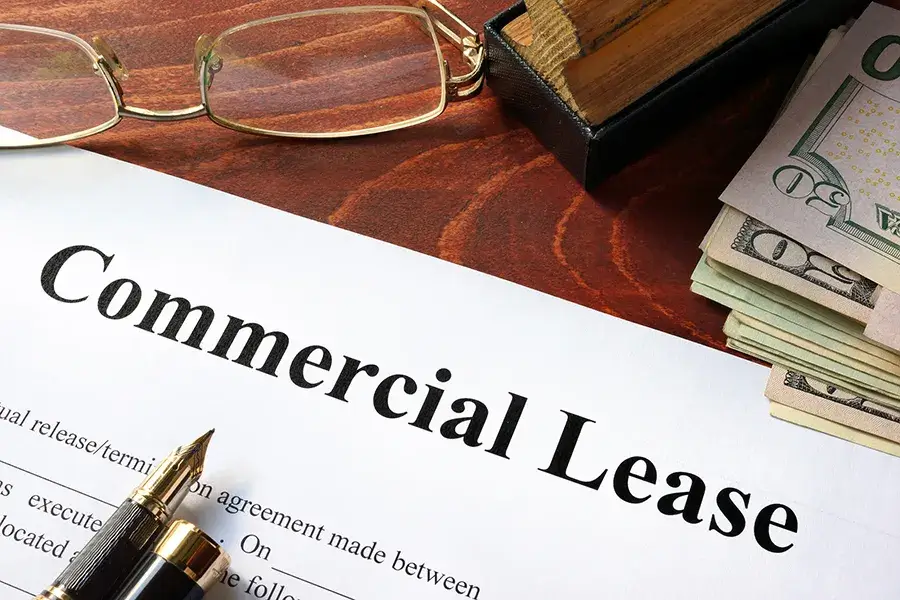Understanding Commercial Lease Penalties in Dubai
Breaking a commercial lease in Dubai can have significant financial and legal implications for tenants. The commercial real estate landscape in Dubai operates under a defined legal framework, and understanding the potential commercial lease penalties for early termination of a lease is essential for businesses to avoid unnecessary complications. This comprehensive guide explores the legal framework governing commercial leases in Dubai, the most common penalties for early termination, and strategies to navigate lease agreements effectively.

Legal Framework Governing Commercial Lease Penalties in Dubai
Commercial leases in Dubai are primarily regulated by Law No. 26 of 2007, amended by Law No. 33 of 2008. These laws outline the rights and responsibilities of both landlords and tenants, ensuring a balanced relationship. While the legal framework does not explicitly address commercial lease penalties for early termination, it emphasizes that lease agreements should include clear terms regarding termination and associated penalties. This means that the specifics of any penalties are largely dictated by the lease contract itself.
Key Provisions in Dubai’s Lease Law
- Binding Nature of Contracts: Lease agreements are binding, and both parties are expected to adhere to the stipulated terms unless mutually agreed otherwise.
- Early Termination Clauses: Tenants and landlords are encouraged to include clauses in the lease contract detailing the conditions under which early termination is allowed and the associated penalties.
- Role of the Rental Dispute Settlement Centre (RDSC): In case of disputes, the RDSC is the designated authority to mediate and resolve issues related to rental contracts.
Common Commercial Lease Penalties
1. Financial Compensation to the Landlord
One of the most significant penalties for breaking a commercial lease is financial compensation to the landlord. This compensation often includes:
- Rent for Remaining Lease Term: Tenants may be required to pay rent for the remaining duration of the lease term. For instance, if a tenant terminates a one-year lease six months early, they may be liable for the rent for those six months.
- Two Months’ Rent Penalty: Many lease agreements stipulate a penalty equivalent to two months’ rent. This amount compensates the landlord for the potential income loss while searching for a new tenant.
2. Forfeiture of Security Deposit
Security deposits are typically collected at the start of the lease to cover potential damages or unpaid rent. When a tenant breaks a lease without mutual agreement or valid justification, the landlord may retain the entire security deposit to offset losses.
3. Legal Fees and Costs
Tenants may be held liable for legal fees incurred by the landlord if disputes arise from early termination. These fees can include:
- Costs associated with mediation or arbitration through RDSC.
- Court fees if the dispute escalates to a legal proceeding.
4. Negative Impact on Credit Rating
In cases where a landlord pursues legal action for unpaid rent or commercial lease penalties, tenants risk damaging their credit rating. This can affect the tenant’s ability to secure financing or enter into future lease agreements.
5. Reputational Damage
Breaking a lease can tarnish a tenant’s reputation within Dubai’s commercial property market. Landlords and real estate agents may be hesitant to engage with tenants known for breaching contracts, limiting future leasing opportunities.
Conditions That May Allow Early Termination Without Commercial Lease Penalties
While penalties are common, there are circumstances under which tenants may terminate a commercial lease without incurring significant consequences:
1. Mutual Agreement
Landlords and tenants can mutually agree to terminate the lease early. In such cases, the parties may negotiate reduced penalties or waive them entirely.
2. Early Exit Clause
Some lease agreements include an early exit clause, which allows tenants to terminate the lease under specific conditions. For example, the clause may require a notice period and payment of a pre-determined penalty.
3. Landlord’s Breach of Contract
If the landlord fails to meet their contractual obligations—such as providing necessary repairs or maintaining a habitable premises—tenants may have grounds to terminate the lease without commercial lease penalties
4. Force Majeure Events
Unforeseen circumstances, such as natural disasters or government actions, may invoke a force majeure clause, allowing tenants to terminate leases without penalties. It is essential to verify if this clause is included in the lease agreement.
Best Practices for Avoiding Commercial Lease Penalties
To minimize potential penalties, tenants should adopt proactive measures when entering into or managing a commercial lease:
1. Review Lease Agreements Thoroughly
Before signing, carefully review all terms related to early termination and penalties. Ensure the agreement includes clear and reasonable conditions for ending the lease.
2. Negotiate Favorable Terms
Negotiate for an early exit clause or reduced penalties during the lease drafting stage. This provides flexibility in case circumstances change during the lease term.
3. Communicate Openly with the Landlord
If circumstances arise that necessitate breaking the lease, inform the landlord promptly. Open communication can lead to amicable solutions, such as reduced commercial lease penalties or an agreement to find a replacement tenant.
4. Maintain Documentation
Document all correspondence and agreements with the landlord, particularly regarding maintenance issues or disputes. This can serve as evidence in case of legal disputes.
5. Seek Legal Advice
Consulting with a legal professional specializing in commercial real estate is essential for understanding the potential consequences and exploring options for minimizing commercial lease penalties.
Resolution Options for Lease Disputes
1. Direct Communication
Many disputes can be resolved through direct negotiation between landlords and tenants. This approach saves time and avoids the costs associated with legal proceedings.
2. Mediation Through RDSC
If direct communication fails, tenants can seek mediation services through the Rental Dispute Settlement Centre (RDSC). The RDSC provides a structured platform for resolving disputes efficiently.
3. Legal Action
As a last resort, tenants may pursue legal action through Dubai courts. However, this approach is often time-consuming and expensive, so it should be considered only after exhausting other options.
Conclusion
Breaking a commercial lease in Dubai can have far-reaching financial and legal implications. Tenants must understand the common commercial lease penalties, including financial compensation, forfeiture of security deposits, and reputational damage. By thoroughly reviewing lease agreements, negotiating favorable terms, and maintaining open communication with landlords, businesses can navigate lease termination more effectively. For any disputes or complex cases, seeking professional legal advice is crucial.
Frequently Asked Questions
Q1: What is the typical penalty for breaking a commercial lease in Dubai?
A1: Common penalties include paying rent for the remaining lease term, a penalty equivalent to two months’ rent, or forfeiture of the security deposit.
Q2: Can I recover my security deposit if I break my lease?
A2: If the lease is terminated without mutual agreement or valid grounds, the landlord may retain the security deposit to cover unpaid rent or damages.
Q3: What should I do if I need to break my commercial lease?
A3: Communicate with your landlord promptly, review your lease for early exit clauses, and consider seeking legal advice to negotiate favorable terms.
Q4: Are there circumstances that allow me to break my lease without penalties?
A4: Yes, circumstances such as mutual agreement, early exit clauses, landlord’s breach of contract, or force majeure events may allow termination without penalties.
Q5: How can I protect myself from penalties when signing a new lease?
A5: Ensure the lease includes clear terms related to early termination and commercial lease penalties, and negotiate for clauses that provide flexibility if circumstances change.
Mazen Alzoubi – Commercial Consultant
Other Useful Links








